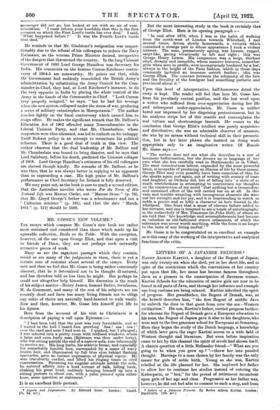GOSSE'S NEW VOLUME.*
174. ed. net.] Duckworth. [18s. net.]
The essays which compose Mr. Gosse's new book are rather more sustained and considered than those which made up his agreeable collection, Books on the Table. With the exception, however, of the one upon George Eliot, and that upon a visit to friends of Ibsen, they are not perhaps such outwardly attractive pieces of work.
Many as are the sagacious passages which they contain, sound as are many of the judgments in them, there is yet a certain note of restraint about several of the essays. Every now and then we feel that Mr. Goose is being rather consciously discreet, that he is determined not to be thought ill-natured, and has therefore told us less than he might. But perhaps he
could not altogether help himself. His discretion is the result of his subject-matter—Henry James, Samuel Butler, Swinburne, M. de Gourmont, and many of the rest of his subjects are too recently dead and have too many living friends not to oblige
any critic of theirs not naturally hard-hearted to walk warily. Now and then, however, Mr. Goose lets himself give life to his figures.
Here from the account of his visit to Christiania is a
description of paying a call upon BjCirnson :—
" I had been told that the poet was very formidable, and as I waited in the hall I heard him growling Sea ! sea ! saa!' over the card and note I had sent in. I quaked, but I plunged ; I was ushered into a pretty room with trellised windows, where a large and even burly man (Bjornson was then under forty), who was sitting astride the end of a narrow sofa, rose vehemently to receive me. His long limbs, his athletic frame, and especially his remarkably forcible face, surrounded by a mane of wavy brown hair, and illuminated by full blue eyes behind flashing spectacles, gave an instant impression of physical vigour. He was truculently cordial, and lifted his ringing tones in civil conversation. Resuming his singular attitude astride the sofa, ho entered affably into a loud torrent of talk, lolling back, shaking his great head, suddenly bringing himself up into a sitting posture to shout out, with a palm pressed upon either knee, some question or statement."
It is an excellent little portrait. But the most interesting study in the book is certainly that of George Eliot. Here is its opening paragraph :-
" In and after 1876, when I was in the habit of walking from the north-west of London towards Whitehall, I met several times, driven slowly homewards, a victoria which contained a strange pair in whose appearance I took a violent interest. The man, prematurely ageing, was hirsute, rugged, satyr-like, gazing vivaciously to left and right ; this was George Henry Lewes. His companion was a large, thickset sibyl, dreamy and immobile, whose massive features, somewhat grim when seen in profile, were incongruously bordered by a hat, always in the height of the Paris fashion, which in those days commonly included an immense ostrich feather ; this was George Eliot. The contrast between the solemnity of the face and the frivolity of the headgear had something pathetic and provincial about it."
Upon this level of interpretative, half-humorous detail the essay is kept. The reader will feel that here Mr. Gosse has, from his peculiarly central position, said the last word upon a writer who suffered from over-appreciation during her life and subsequent under-appreciation. Mr. Gosse is neither bored nor impressed by her disguising portentousness, but in his analyses strips her of this mantle and contemplates the real virtues and shortcomings beneath. He comes to the conclusion that George Eliot's intellect was purely acquisitive and distributive, she was an admirable observer of manners, she was by no means without technical skill in their presenta- tion, but in her later phases she insisted on doing work appropriate only to an imaginative writer. Of Bomola Mr. Gosse says :- " The author does not sea what she describes in a sort of luminous hallucination, but she dresses up in language of her own what she has carefully read in Burlamacchi or in Villari. The most conscientious labour, expended by the most powerful brain, is incapable of producing an illusion of life by these means. George Eliot may even possibly have been conscious of this, for she speaks again and again, not of writing with ecstasy of tears and laughter, as Dickens did, but of falling into ' a state of so much wretchedness in attempting to concentrate my thoughts on the construction of my novel ' that nothing but a tremendous and sustained effort of the will carried her on at all. In this vain and terrible wrestling with incongruous elements she wore out her strength and her joy, and it is heartrending to watch so noble a genius and so lofty a character as hers wasted in the whirlpool. One fears that a sense of obscure failure added to her tortures, and one is tempted to see a touch of autobiography in the melancholy of Mrs. Transome (in Felix Holt), of whom we are told that her knowledge and accomplishments had bocomo as valueless as old-fashioned stucco ornaments, of which the substance was never worth anything, while the form is no longer to the taste of any living mortal.' " Mr. Gosse is to be congratulated on so excellent an example as is this essay of the working of the interpretative and analytical functions of the critic.


































 Previous page
Previous page